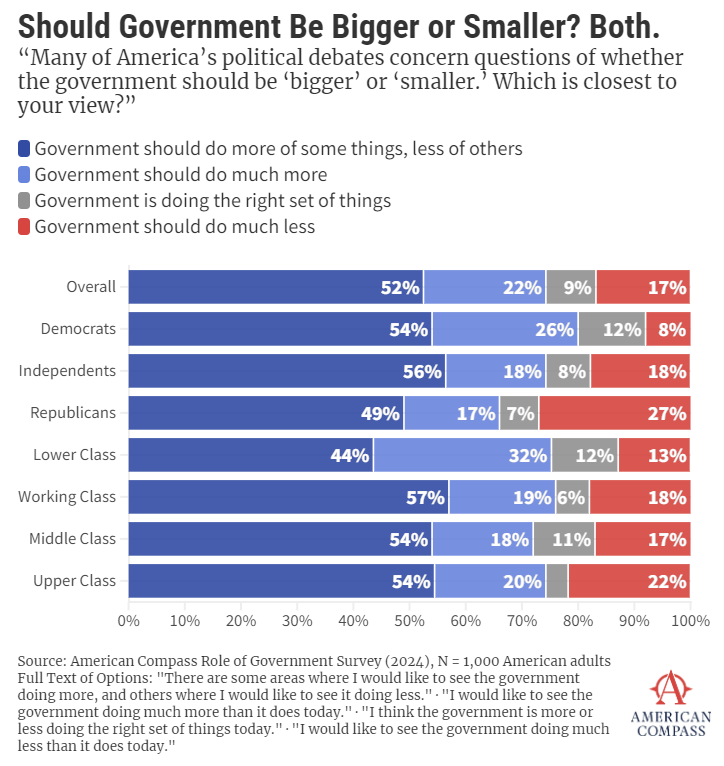Bonjour! Here’s your PolicySphere morning briefing! If you were forwarded this, here’s more about who we are and what we’re doing and, of course, don’t forget to sign up.
#PolicySphereSeries #InfrastructureWeek – You’ll forgive us for indulging in a bit of narcissism by using this newsletter to talk about us for a minute.
Firstly, do not hesitate to email us directly with any comments about the Morning Briefing. The feedback so far has exceeded all our expectations.
Secondly, we are proud to announce the next stage of PolicySphere content: a feature we are calling PolicySphere Series. It is pretty much what it sounds like: a series of articles, drilling down on one particular policy issue. Expect explainers, deep dives, charts, data, interviews, and more!
One problem with public policy is that it is both so broad and so deep. Policy professionals need to have awareness of numerous fields, each of which is deep enough to occupy the lives of many experts. How do we, as a media outlet designed to help policy professionals do a better job, manage to accomplish both breadth and depth? Our Morning Briefing, we hope, achieves breadth, keeping you abreast of what’s new in the world of policy every day. PolicySphere Series, we hope, will add depth, by giving you comprehensive coverage of particular issues.
Where are we starting? Infrastructure Week! The idea that this is where we should start was prompted by the shocking and tragic collapse of the Key Bridge in Baltimore. Yesterday we wrote that, pending further evidence, the collapse probably had more to do with what we and others are referring to as the competency crisis; we stand by those words. However, there is no easy policy fix to the competency crisis; in policy terms, it is not one issue, but a constellation of issues (we realize now we should have added legal weed to the list yesterday).
We also wrote that, inevitably, this event would restart the conversation around infrastructure. It is a conversation worth having.
Under the last Administration, “Infrastructure Week” became a bit of a running joke, as the White House’s attempt to focus the political conversation on infrastructure always seemed to be undercut by events. We hope that won’t be the case here. And, like the original, this Infrastructure Week may not last a literal week. But we hope it contributes to the conversation. And as always we are eager for your feedback.
Now for your regularly scheduled programming…
#Realignment – Fascinating new opinion poll from American Compass showing the changing views of Republican voters on the government’s role in the economy: “A key feature of the ongoing realignment in American politics is the declining relevance of the “bigger government” versus “smaller government” frame within which many debates occurred in the post–Cold War period. The archetypical “socially liberal, fiscally conservative” voter has moved into the Democratic Party while many non-white and lower-income voters traditionally more supportive of government programs have moved into the Republican Party. As conservatives have turned away from market fundamentalism, they have also become more open to a variety of policy interventions in the economy.” There is more to say, but you should read the whole thing.
#Trade #China #AmericanManufacturing – China has filed a WTO complaint against the United States over “discriminatory” subsidies for electric vehicles. Yes, insert your own joke, here. But there’s nothing funny about it. As Brad Stetser, one of the best trade policy experts we know, points out, “China has mastered ‘Buy China’ as a policy even if it isn’t written into law. But whoever advised China to bring this case either miscalculated its effect, or wants to break the WTO.” If it’s the latter, look out.
#Antitrust #BigTech – Hoover’s Richard Epstein on the DOJ’s antitrust lawsuit against Apple.
#Immigration – Daily Mail US coverage of Sen. Mike Lee’s bill to prevent the use of the CBP One app to allow migrants to fly airplanes freely within the US.
#Homelessness #Atomization – “Senior homelessness could be an emerging problem in some cities, even if it’s a manageable one that—as of yet—does not deserve being called a ‘crisis,'” writes Stephen Eide for the Institute for Family Studies.
#AI #BigTech – We tend to think that one of the big problems from AI will be an explosion of spam and an arms race between spam and anti-spam AIs. Via Bloomberg’s Joe Weisenthal, we learned that more and more “people [are] using AI chatbots to submit bug reports or pursue bounties on open source software projects. You can just see how there’ll be an explosion of this kind of spam”
#AI #BigTech – Speaking of AI, here’s an AI generated country song about Joe Biden and inflation. It’s frighteningly good. And here’s a 100% AI-generated Instagram influencer video.
#ComplexSystems – Here’s an important thread from libertarian author Travis J. I. Corcoran, responding to the Key Bridge collapse: the normal state is not for things to work, it is for them to not work: “The normal state of cargo ships is sinking/no electrical power/no rudder control. Only constant maintenance, discipline, and executive function keeps cargo ships out of that ground state and in a more energetic state. The power in your house does not ‘want’ to be on. The clean water does not ‘want’ to flow. The supermarket does not ‘want’ to be stocked. Entropy is always and everywhere trying to destroy, corrode, sink, and endarken. Do not marvel when a ship loses power and crashes. Marvel every other day that engineering, Western civilization, and good luck keep up suspended out of that muck 999 times out of 1,000.”
Predictably, we have already seen conspiracy theories about the Key Bridge collapse. Certainly in 2024 everyone should stay open to every explanation and all facts, even strange ones. But there’s a way in which conspiracy thinking is what we call “competence porn,” or a security blanket: a way of reassuring oneself that the people in charge may be evil, but at least they’re hyper-smart and hyper-competent. It may be even more terrifying to realize there’s nobody in charge and the people running things are mostly mediocre and incompetent.
Chart of the Day
From American Compass’s new survey:

Meme of the Day
(An oldie but a goodie)

